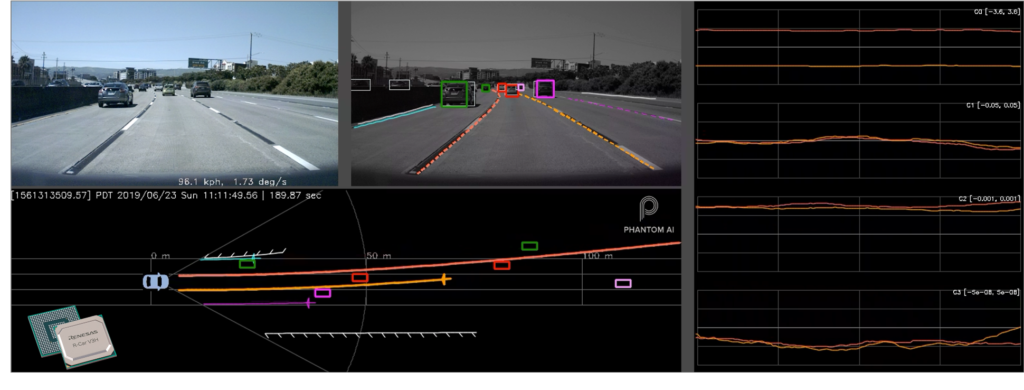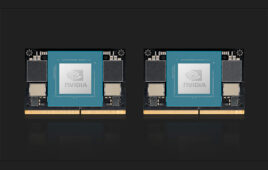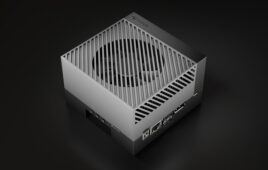Autonomous driving system developer Phantom AI Inc. yesterday said it is collaborating with Renesas Electronics Corp. on developing a “full-stack” Level 2 driver-assistance system.
Burlingame, Calif.-based Phantom AI makes advanced driver assistance systems (ADAS) using computer vision, sensor fusion, and control capabilities. The company, which raised $22 million in Series A funding in April, claimed that its modular software components are “the most accurate and highest-performing AI solutions available today that meet car manufacturer requirements, at a much lower price than existing solutions.”
Renesas‘ R-Car V3H is its third-generation system on a chip (SoC) for delivering high-performance computer vision and artificial intelligence processing at low power levels. Designed for ADAS applications such as smart-camera and surround-view systems, the R-Car V3H includes dedicated accelerators for complex deep learning algorithms and highly verifiable image recognition processing, according to the Tokyo-based company. It acquired Integrated Device Technology Inc. in March 2019.
In addition, the SoC incorporates an on-chip image signal processor (ISP) to convert sensor signals for image rendering and recognition processing. This makes it possible to configure a system using inexpensive cameras without built-in ISPs, reducing the overall bill-of-materials cost, said Renesas.
Phantom AI puts ADAS on SoC
Renesas’ R-Car V3H provides enough computing power to enable Phantom AI’s vehicle-agnostic Level 2 ADAS feature set and meet functional safety needs, said the companies. They said the full-stack offering includes the following core products:
- PhantomVision: a highly scalable deep learning-based computer vision system that supports vehicle, pedestrian, bicyclist, free-space, traffic sign, and traffic light detection
- PhantomFusion: a platform-independent sensor-fusion and object-tracking system that uses camera, radar, and lidar and helps vehicles to keep track of anything surrounding them
- PhantomDrive: a complete ADAS control system that enables features such as adaptive cruise control, lane centering, and automatic lane change.
Functional safety is a key requirement of vehicle manufacturers, and Phantom AI said its collaboration with Renesas enables its systems to comply with ISO26262 standards. Renesas provides a fully optimized and validated SoC/PMIC/ timing chip set to reduce development efforts and costs. The integration of real-time core integration in an SoC, including full AUTOSAR support removing the need of external MCU, contributes to further bill of materials reduction, said Phantom.
“Phantom AI’s full-stack L2 ADAS solution on Renesas’s system-on-chip is a powerful combination that customers are demanding,” said Hyunggi Cho, co-founder and CEO of Phantom AI. “Renesas’ R-Car V3H provides a perfect balance between deep learning and traditional computer vision hardware acceleration and is an ideal complement to our computer vision technology.”

Phantom AI full stack L2 ADAS solution on Renesas V3H. Source: Phantom AI
Market growth depends on cost, performance
The global market for ADAS will reach $134.9 billion by 2027, up from $30 billion in 2019, predicts Markets and Markets. As such technologies are developed and refined, car manufacturers hope to appeal to a wide range of customers with an increasing range of safety and convenience-focused features, said Phantom AI.
Phantom AI added that its software provides OEMs and Tier 1 suppliers an opportunity to deploy ADAS solutions across various low- to mid-end vehicle platforms where development cost is a big concern for manufacturers. The software provides a reliable, cost-effective NCAP 2020-compliant solution with no impact on the system performance, according to the company.
“Renesas has been collaborating with Phantom AI to enable their series of ADAS software stacks on our R-Car V3H SoC,” said Masa Yoshida, vice president of the Automotive Digital Products Marketing Division at Renesas. “We are proud to be able to offer this software to our customers to realize faster time to market in Level 2 ADAS systems.”





Tell Us What You Think!